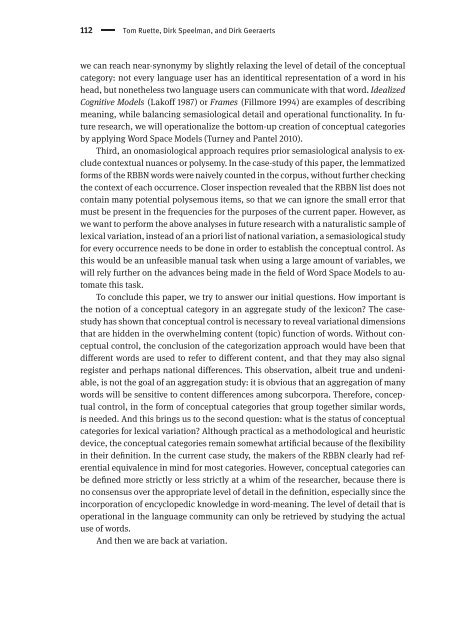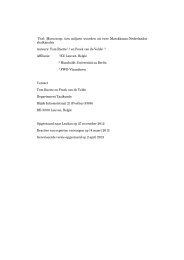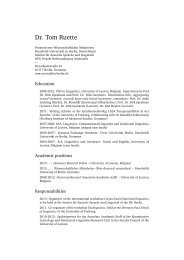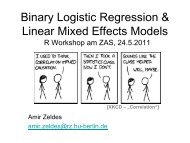Lexical variation in aggregate perspective
Lexical variation in aggregate perspective
Lexical variation in aggregate perspective
You also want an ePaper? Increase the reach of your titles
YUMPU automatically turns print PDFs into web optimized ePapers that Google loves.
112 Tom Ruette, Dirk Speelman, and Dirk Geeraerts<br />
we can reach near-synonymy by slightly relax<strong>in</strong>g the level of detail of the conceptual<br />
category: not every language user has an identitical representation of a word <strong>in</strong> his<br />
head, but nonetheless two language users can communicate with that word. Idealized<br />
Cognitive Models (Lakoff 1987) or Frames (Fillmore 1994) are examples of describ<strong>in</strong>g<br />
mean<strong>in</strong>g, while balanc<strong>in</strong>g semasiological detail and operational functionality. In future<br />
research, we will operationalize the bottom-up creation of conceptual categories<br />
by apply<strong>in</strong>g Word Space Models (Turney and Pantel 2010).<br />
Third, an onomasiological approach requires prior semasiological analysis to exclude<br />
contextual nuances or polysemy. In the case-study of this paper, the lemmatized<br />
forms of the RBBN words were naively counted <strong>in</strong> the corpus, without further check<strong>in</strong>g<br />
the context of each occurrence. Closer <strong>in</strong>spection revealed that the RBBN list does not<br />
conta<strong>in</strong> many potential polysemous items, so that we can ignore the small error that<br />
must be present <strong>in</strong> the frequencies for the purposes of the current paper. However, as<br />
we want to perform the above analyses <strong>in</strong> future research with a naturalistic sample of<br />
lexical <strong>variation</strong>, <strong>in</strong>stead of an a priori list of national <strong>variation</strong>, a semasiological study<br />
for every occurrence needs to be done <strong>in</strong> order to establish the conceptual control. As<br />
this would be an unfeasible manual task when us<strong>in</strong>g a large amount of variables, we<br />
will rely further on the advances be<strong>in</strong>g made <strong>in</strong> the field of Word Space Models to automate<br />
this task.<br />
To conclude this paper, we try to answer our <strong>in</strong>itial questions. How important is<br />
the notion of a conceptual category <strong>in</strong> an <strong>aggregate</strong> study of the lexicon? The casestudy<br />
has shown that conceptual control is necessary to reveal <strong>variation</strong>al dimensions<br />
that are hidden <strong>in</strong> the overwhelm<strong>in</strong>g content (topic) function of words. Without conceptual<br />
control, the conclusion of the categorization approach would have been that<br />
different words are used to refer to different content, and that they may also signal<br />
register and perhaps national differences. This observation, albeit true and undeniable,<br />
is not the goal of an aggregation study: it is obvious that an aggregation of many<br />
words will be sensitive to content differences among subcorpora. Therefore, conceptual<br />
control, <strong>in</strong> the form of conceptual categories that group together similar words,<br />
is needed. And this br<strong>in</strong>gs us to the second question: what is the status of conceptual<br />
categories for lexical <strong>variation</strong>? Although practical as a methodological and heuristic<br />
device, the conceptual categories rema<strong>in</strong> somewhat artificial because of the flexibility<br />
<strong>in</strong> their def<strong>in</strong>ition. In the current case study, the makers of the RBBN clearly had referential<br />
equivalence <strong>in</strong> m<strong>in</strong>d for most categories. However, conceptual categories can<br />
be def<strong>in</strong>ed more strictly or less strictly at a whim of the researcher, because there is<br />
no consensus over the appropriate level of detail <strong>in</strong> the def<strong>in</strong>ition, especially s<strong>in</strong>ce the<br />
<strong>in</strong>corporation of encyclopedic knowledge <strong>in</strong> word-mean<strong>in</strong>g. The level of detail that is<br />
operational <strong>in</strong> the language community can only be retrieved by study<strong>in</strong>g the actual<br />
use of words.<br />
And then we are back at <strong>variation</strong>.






